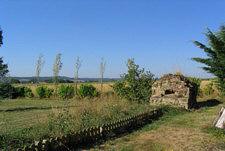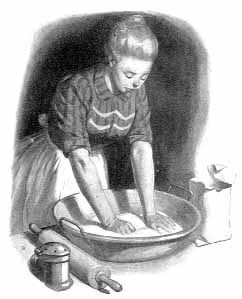Bread is the oldest and most important baked product.
 It has been made from many of the grains, including wheat, corn, rye, rice, barley, oats and even buckwheat. Bread, in one form or another, has been one of the principal forms of food for man from earliest times.
It has been made from many of the grains, including wheat, corn, rye, rice, barley, oats and even buckwheat. Bread, in one form or another, has been one of the principal forms of food for man from earliest times.Wheat has been found in pits where human settlements flourished 8,000 years ago. The ancient Greeks and Romans knew bread for a staple food even in those days people argued whether white or brown bread was best.
Further back, in the Stone Age, people made solid cakes from stone-crushed barley and wheat. A millstone used for grinding corn has been found, that is thought to be 7,500 years old. The ability to sow and reap cereals may be one of the chief causes, which led man to dwell in communities, rather than to live a wandering life hunting and herding cattle.
When ancient man discovered a food that would keep through the winter months, and could be multiplied in the summer, it could be said that civilization began. He might have a reasonably safe store of food to carry him over, which would give him time to develop other useful skills besides hunting, fishing and cattle-herding.
Bread was leavened; that is, an agent in the form of a 'barm' was added to the dough that caused the mixture to rise in the shape of our familiar loaf. The hurried departure of the Israelites from Egypt, described in the Book of Exodus in the Bible, prevented their bread being leavened as usual; the Jews today commemorate this event by eating unleavened bread on special occasions.The ruins of Pompeii and other buried cities have revealed the kind of bakeries existing in those historic times. There were public bakeries where the poorer people brought their bread to be baked, or from which they could buy ready-baked bread.
 The bakers in Rome at period 168 BC enjoyed special privileges: they were the only craftsmen who were freemen of the city, all other trades being conducted by slaves.
The bakers in Rome at period 168 BC enjoyed special privileges: they were the only craftsmen who were freemen of the city, all other trades being conducted by slaves.The Greeks and Romans liked their bread white; color was one of the main tests for quality at the time of Pliny (AD 70). Those who think the craze for white bread is a modern fad should note this. Pliny wrote, "The wheat of Cyprus is swarthy and produces a dark bread, for which reason it is generally mixed with the white wheat of Alexandria". Plato (c. 400 BC) pictured the ideal state where men lived to a healthy old age on wholemeal bread ground from local wheat. Socrates, however, suggested that this proposal meant the whole population would be living on pig-food. In those days, there were certain bakers who kneaded the meal with seawater to save the price of salt. Pliny did not approve of this.
The Romans enjoyed several kinds of bread, with interesting names. There was oyster bread (to be eaten with oysters); 'artolaganus' or cakebread; 'speusticus' or 'hurry bread'. There was oven bread, tin bread, and Parthian bread. There were rich breads made with milk, eggs and butter, but these of course, were only for the wealthy and privileged people. The Egyptian grammarian and philosopher Athenaeus, who lived in the third century AD, has handed down to us considerable knowledge about bread and baking in those days.
He wrote that the best bakers were from Phoenicia or Lydia, and the best bread-makers from Cappadocia. He gives us a list of the sorts of bread common in his time-leavened and unleavened loaves; loaves made from the best wheat flour; loaves made from groats, or rye, and some from acorns and millet. There were lovely crusty loaves too, and loaves baked on a hearth. Bakers
 made bread mixed with cheese, but the favorite of the rich was always white bread made from wheat. In ancient Greece, keen rivalry existed between cities as to which produced the best bread.
made bread mixed with cheese, but the favorite of the rich was always white bread made from wheat. In ancient Greece, keen rivalry existed between cities as to which produced the best bread.In early English historical times, there were constantly recurring periods of famine, due to not enough, or too much rain, or frosts, and other natural causes. The ruling classes, knowing that rebellion often followed famine, did their utmost to keep the price of bread from rising too high. Laws regulating its price were passed during the reign of King John (1202). Not only did the law fix the price, but also it strictly allocated that price between cost of material and an allowance for necessary charges to the baker.
Food History


